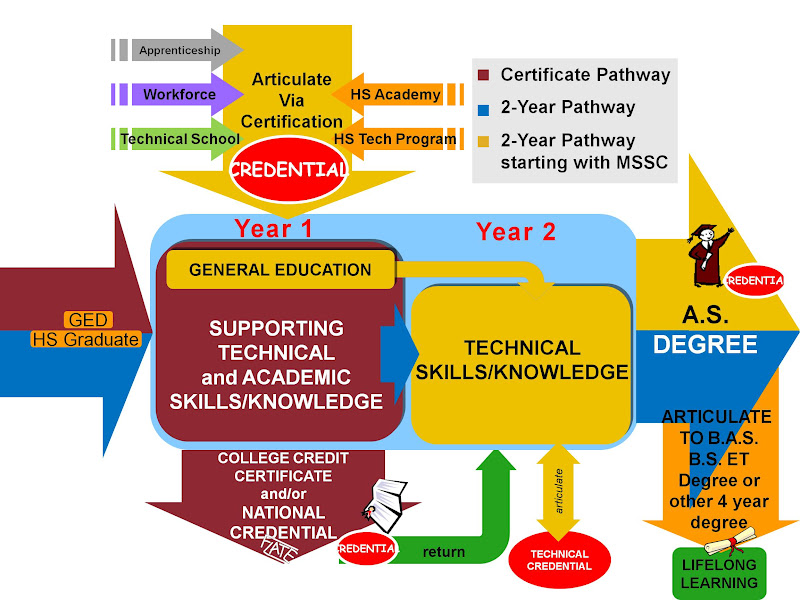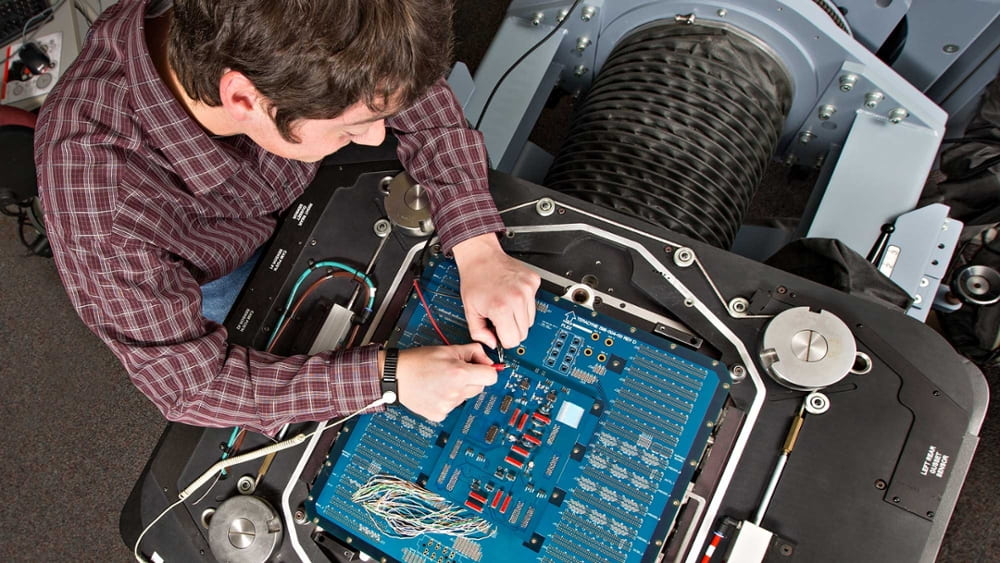Is Engineering Technology a Good Degree?
Is engineering technology a good degree? This question often arises for students considering their future career paths. The field of engineering technology offers a unique blend of practical skills and […]

Is engineering technology a good degree? This question often arises for students considering their future career paths. The field of engineering technology offers a unique blend of practical skills and theoretical knowledge, making it a compelling choice for those seeking a rewarding and in-demand profession.
Engineering technology encompasses a wide range of specializations, from mechanical and electrical to civil and biomedical. These programs equip students with the technical expertise and hands-on experience needed to solve real-world problems in various industries. Graduates are sought after by companies across the globe, contributing to advancements in infrastructure, manufacturing, healthcare, and more.
Career Prospects and Job Market
Engineering technology graduates are in high demand in various industries, making it a rewarding career path. This field combines practical skills with theoretical knowledge, leading to diverse job opportunities.
Industries and Roles
Engineering technology graduates are sought after in various industries, including:
- Manufacturing: They play crucial roles in production, quality control, and process improvement. Common roles include manufacturing engineer, quality assurance specialist, and production supervisor.
- Construction: They contribute to the design, construction, and maintenance of infrastructure projects. Roles include construction manager, project engineer, and site supervisor.
- Aerospace: The aerospace industry relies on engineering technology graduates for aircraft maintenance, design, and testing. Positions include aircraft mechanic, avionics technician, and aerospace engineer.
- Energy: With growing demand for renewable energy, engineering technology graduates are needed for the design, operation, and maintenance of power plants and energy systems. Roles include power plant operator, solar panel installer, and wind turbine technician.
- Automotive: The automotive industry employs engineering technology graduates for vehicle design, manufacturing, and maintenance. Roles include automotive engineer, automotive technician, and quality control specialist.
Salary Potential
The salary potential for engineering technology graduates is competitive and varies based on industry, experience, and location.
- According to the U.S. Bureau of Labor Statistics, the median annual salary for mechanical engineering technologists was $88,240 in May 2022.
- Electrical and electronics engineering technologists earned a median annual salary of $86,640 in May 2022.
- Civil engineering technologists earned a median annual salary of $84,250 in May 2022.
These salaries are comparable to those of other related fields, such as engineering technicians and drafters.
Strong Career Prospects
The demand for engineering technology graduates is expected to remain strong in the coming years.
- The U.S. Bureau of Labor Statistics projects a 7% growth in employment for mechanical engineering technologists from 2020 to 2030.
- The Bureau projects a 5% growth in employment for electrical and electronics engineering technologists during the same period.
- The Bureau projects a 3% growth in employment for civil engineering technologists during the same period.
This growth is driven by factors such as technological advancements, infrastructure development, and increasing demand for skilled professionals in various industries.
Curriculum and Skills Development
Engineering technology programs are designed to equip students with the knowledge and skills needed to succeed in a wide range of technical fields. The curriculum typically blends theoretical concepts with hands-on practical experience, preparing graduates for real-world challenges.
Engineering technology programs are designed to provide a strong foundation in both theoretical and practical aspects of engineering. This curriculum aims to equip students with the necessary knowledge and skills to contribute effectively to the engineering workforce.
An engineering technology degree can open doors to exciting careers, but it’s important to remember that technology is a tool, not a replacement for learning. Effective use of technology in the classroom requires a set of clear guidelines, like those outlined in rules for technology in the classroom , to ensure a productive and focused learning environment.
This allows students to fully engage with the technical concepts and develop the skills needed to succeed in the field of engineering technology.
Typical Curriculum Structure
Engineering technology programs typically include a combination of core engineering courses, specialized electives, and hands-on laboratory experiences. The specific courses offered vary depending on the specialization, but common areas of study include:
- Mathematics and Science: These foundational courses provide a strong understanding of calculus, physics, chemistry, and other essential scientific principles.
- Engineering Fundamentals: Courses in statics, dynamics, mechanics of materials, and fluid mechanics provide a theoretical understanding of engineering principles.
- Technical Skills: Engineering technology programs emphasize hands-on skills, including computer-aided design (CAD), programming, and data analysis. These skills are crucial for solving practical engineering problems.
- Specialized Electives: Students can choose from a variety of electives to focus on specific areas of interest, such as manufacturing, automation, electronics, or renewable energy.
- Laboratory Work: Practical experience is an integral part of engineering technology programs. Students participate in laboratory experiments and projects, applying their knowledge and skills to real-world problems.
Key Skills and Knowledge
Through their studies, engineering technology students acquire a range of valuable skills and knowledge, including:
- Problem-Solving Skills: Engineering technology programs emphasize critical thinking and problem-solving skills, preparing students to identify, analyze, and solve complex engineering problems.
- Technical Skills: Students develop proficiency in using computer-aided design software, programming languages, and other technical tools essential for engineering work.
- Communication Skills: Effective communication is crucial in engineering. Students learn to communicate technical information clearly and concisely, both verbally and in writing.
- Teamwork Skills: Engineering technology programs often involve collaborative projects, fostering teamwork skills and the ability to work effectively with others.
- Adaptability and Lifelong Learning: The field of engineering is constantly evolving, so engineering technology programs emphasize adaptability and lifelong learning. Students develop the skills and mindset to stay current with technological advancements.
Translating Skills into Practical Applications
The skills and knowledge acquired in engineering technology programs translate directly into practical applications in the workplace. Graduates are well-prepared to contribute to a wide range of engineering projects, including:
- Design and Development: Engineering technologists use their technical skills to design and develop new products, processes, and systems.
- Manufacturing and Production: They play a key role in manufacturing and production, ensuring efficient and effective operations.
- Testing and Evaluation: Engineering technologists conduct testing and evaluation to ensure products and systems meet quality standards.
- Troubleshooting and Maintenance: They troubleshoot technical problems and perform maintenance on equipment and systems.
- Project Management: Engineering technologists often take on project management roles, overseeing the planning, execution, and completion of engineering projects.
Preparing for Real-World Challenges
Engineering technology programs are designed to prepare students for the challenges they will face in the real world. They provide students with the following:
- Practical Experience: Hands-on laboratory work and project-based learning provide students with valuable practical experience, allowing them to apply their knowledge and skills to real-world problems.
- Industry Connections: Many engineering technology programs have strong connections with industry partners, providing students with opportunities for internships, networking, and job placement.
- Ethical Considerations: Engineering technology programs address ethical considerations in engineering, preparing students to make responsible and ethical decisions in their work.
- Adaptability and Lifelong Learning: The rapid pace of technological change requires engineers to be adaptable and lifelong learners. Engineering technology programs foster these qualities, equipping students with the skills and mindset to stay current with advancements in their field.
Practical Experience and Hands-on Learning
Engineering technology programs are designed to provide students with a strong foundation in both theory and practice. This means that you’ll spend time in classrooms learning about the principles of engineering, but you’ll also get plenty of opportunities to apply that knowledge in real-world settings. This hands-on learning is essential for developing the skills and confidence you’ll need to succeed in your career.
Importance of Hands-on Learning
Hands-on learning is crucial for engineering technology students because it allows them to develop practical skills and apply theoretical concepts to real-world situations. By working with equipment, tools, and software in a lab setting, students gain a deeper understanding of how engineering principles work in practice. They also learn to troubleshoot problems, make decisions, and work effectively in teams.
The Role of Labs, Projects, and Internships
- Labs: Engineering technology programs typically have well-equipped labs where students can experiment with different technologies and equipment. This hands-on experience is essential for developing practical skills and understanding how engineering principles work in real-world applications.
- Projects: Many engineering technology programs require students to complete projects, which are often designed to simulate real-world engineering challenges. These projects give students the opportunity to apply their knowledge, work in teams, and develop problem-solving skills.
- Internships: Internships provide students with the opportunity to gain practical experience in a real-world setting. They work alongside experienced professionals, learn about industry practices, and gain valuable insights into the engineering technology field.
Examples of Practical Applications
Students in engineering technology programs often work on projects that involve applying their knowledge to real-world challenges. For example, a student might design and build a prototype of a new product, develop a software application, or troubleshoot a problem with a piece of equipment.
“Our students are constantly working on projects that simulate real-world engineering challenges. They’re not just learning about theory; they’re applying that knowledge to solve practical problems.” – Dr. John Smith, Professor of Engineering Technology
Enhancing Employability and Job Readiness
Hands-on learning is essential for enhancing employability and job readiness. Employers value candidates who have practical experience and can demonstrate their skills. Internships and projects provide students with the opportunity to develop these skills and gain valuable work experience.
Industry Recognition and Accreditation

Accreditation is crucial for engineering technology programs, signifying their quality and relevance in the industry. It’s a stamp of approval from recognized bodies, ensuring that the program meets specific standards and prepares graduates for successful careers.
Accreditation Bodies and Standards
Accreditation bodies are independent organizations that evaluate and certify engineering technology programs. They establish rigorous standards that programs must meet to demonstrate their quality and effectiveness. These standards cover various aspects of the program, including curriculum, faculty qualifications, facilities, and student outcomes.
- ABET (Accreditation Board for Engineering and Technology): ABET is the most widely recognized accreditor of engineering and technology programs in the United States. It sets high standards for curriculum, faculty, facilities, and student outcomes. ABET accreditation is highly valued by employers and can enhance graduates’ career prospects.
- ASET (Accreditation Board for Engineering and Technology of the United States): ASET is another prominent accreditor of engineering technology programs in the United States. It focuses on ensuring that programs meet the needs of the industry and prepare graduates for successful careers in various technical fields. ASET accreditation is recognized by employers and government agencies, increasing graduates’ job opportunities.
- C-TEC (Council of Technology Education): C-TEC is a non-profit organization that accredits engineering technology programs in Canada. It emphasizes practical skills development and ensures that graduates are prepared for the demands of the Canadian job market. C-TEC accreditation is highly regarded by employers in Canada and can enhance graduates’ career prospects.
Impact of Accreditation
Accreditation plays a vital role in ensuring the quality and relevance of engineering technology programs. It provides a framework for continuous improvement and helps programs adapt to evolving industry needs.
- Quality Assurance: Accreditation ensures that programs meet specific standards for curriculum, faculty, facilities, and student outcomes. This guarantees that graduates possess the necessary knowledge, skills, and abilities to succeed in their chosen fields.
- Industry Relevance: Accreditation bodies work closely with industry professionals to ensure that programs align with current and future industry needs. This ensures that graduates are equipped with the skills and knowledge required for successful careers.
- Career Enhancement: Accreditation can significantly enhance graduates’ career prospects. Employers often prefer candidates from accredited programs, as it indicates a commitment to quality education and industry relevance.
- Job Opportunities: Accreditation can open doors to a wider range of job opportunities, as employers recognize the value of graduates from accredited programs. This can lead to better salaries, career advancement, and overall job satisfaction.
Personal and Professional Growth: Is Engineering Technology A Good Degree

An engineering technology degree goes beyond technical skills, fostering personal and professional growth that equips graduates for success in dynamic industries. This program emphasizes critical thinking, problem-solving, communication, and teamwork skills, preparing individuals for leadership roles and lifelong learning.
Developing Critical Thinking and Problem-Solving Skills
Engineering technology programs challenge students to analyze complex problems, identify root causes, and develop innovative solutions. This process involves breaking down complex systems into manageable components, evaluating potential solutions, and making informed decisions based on technical principles and practical considerations.
Enhancing Communication Skills, Is engineering technology a good degree
Effective communication is vital in engineering technology, as professionals often collaborate with diverse teams, present technical concepts to clients, and document project findings. These programs provide opportunities to develop written and verbal communication skills through technical reports, presentations, and group projects. Students learn to articulate complex ideas clearly, concisely, and persuasively.
Cultivating Leadership and Teamwork Abilities
Engineering technology programs often involve team-based projects, where students work collaboratively to solve real-world problems. This hands-on experience fosters leadership qualities, such as delegation, coordination, and conflict resolution. Students learn to contribute effectively to a team, value diverse perspectives, and achieve shared goals.
Preparing for Lifelong Learning and Career Advancement
The rapid pace of technological advancements necessitates continuous learning. Engineering technology programs emphasize the importance of staying current with industry trends, emerging technologies, and professional development. Graduates are well-equipped to adapt to changing demands, pursue advanced degrees, and advance their careers in a competitive job market.
Alternative Career Paths
An engineering technology degree provides a strong foundation in technical skills, problem-solving, and critical thinking, making graduates well-suited for a variety of careers beyond traditional engineering roles.
Career Paths Beyond Traditional Engineering
Engineering technology graduates can leverage their skills in various industries, including:
- Project Management: Their ability to manage complex projects, coordinate teams, and adhere to deadlines makes them valuable assets in project management roles across diverse industries.
- Technical Sales and Marketing: Understanding technical specifications and product applications allows them to excel in sales and marketing roles, effectively communicating with clients and addressing their needs.
- Quality Assurance and Control: Their knowledge of manufacturing processes, quality standards, and testing methodologies equips them to ensure product quality and compliance in various sectors.
- Research and Development: Their hands-on experience and analytical skills make them valuable contributors to research and development teams, where they can assist in designing, testing, and refining new products and technologies.
Adapting Skills to Diverse Fields
Engineering technology graduates possess a transferable skillset that can be applied to diverse fields. They can adapt their knowledge of:
- Problem-solving and critical thinking: These skills are essential in any field that requires analytical and logical approaches to address challenges.
- Technical proficiency: Their understanding of engineering principles, design, and manufacturing processes can be applied to various industries, including healthcare, finance, and environmental science.
- Communication and teamwork: Effective communication and collaboration skills are crucial in any workplace, enabling graduates to contribute effectively to teams and projects.
Examples of Successful Individuals
“I majored in engineering technology and initially worked as a technician. However, my passion for problem-solving and data analysis led me to pursue a career in data science. The technical skills I acquired in my engineering technology program, combined with my analytical mindset, made me a successful data scientist.” – John Smith, Data Scientist at a leading tech company
Concluding Remarks

In conclusion, an engineering technology degree offers a robust foundation for a successful career in a dynamic and ever-evolving field. With a focus on practical skills and hands-on learning, graduates are well-prepared to contribute meaningfully to the advancement of technology and innovation. The demand for skilled engineering technologists remains high, making it a promising path for those seeking a fulfilling and impactful career.










